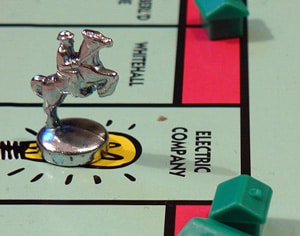
Photo by Mike_fleming/flickr.com
Spend a little time with this recent report from the Center on Budget and Policy Priorities, which details the widening income gap between the very rich and the poor and the middle class over the last 30 years (data garnered from 1979 to 2007). Here are some highlights from the report:
- Since 1979, the average after-tax income for the top 1 percent of Americans rose 281 percent, compared to a 25 percent increase for middle fifth households and 16 percent for the bottom fifth of households. That’s an increase in income of $973,100 per household for the highest earners compared to $11,200 per household for the middle earners.
- From 2007 to 2008 (just one year!), the top 1 percent saw their income increase by $88,800. The middle fifth’s total income was$55,300, which means that the increase in income for the top 1 percent was more than the total income for the middle fifth and bottom fifth combined.
- The share of income going to the top 1 percent of earners doubled from 7.5 percent to 17.1 percent, whereas the share of income going to the bottom four-fifths (80 percent of the population) declined from 58 percent to 48 percent.
- In 2007, the top 1 percent received a larger share of the nation’s income than the middle 20 percent of the population. This is a sharp change from 1979, when the middle 20 percent earned twice as much as the top 1 percent.
And the situation is even worse for most minority groups. For example, a study from Brandeis University showed that between 1984 and 2007 whites had accumulated four times more wealth than blacks.
The rich are getting richer. So what?
After all, even though their income didn’t rise at the same rate, all income brackets did see a rise in income (albeit very slight for some minority groups). So what effect does the disparity in gains have on our society? My gut tells me that such a huge disparity is harmful. But, as I’ve written before, gut feelings have a tendency to be wrong.
Here’s a summary of the potential ills of widening income inequality, from a 2006 New York Times article:
- Sir Michael Marmot, a professor of epidemiology and public health at University College London and director of its International Institute for Society and Health, theorized that increased levels of illness in the United States (compared to Britain) were a result of our greater income inequalities.
- According to a study of 129 countries by Jong-Sung You, a graduate student at the Kennedy School of Government at Harvard, and Sanjeev Khagram, a professor of public affairs at the University of Washington, income inequalities in democracies can lead to corruption and and inefficient public investments that lead to asset bubbles (see Great Recession).
- Edward L. Glaeser, a professor of economics at Harvard, argues that income inequality may breed more inequality as the wealthy use their resources to lobby for policy that protects and increases their wealth at the expense of budget deficits and public services that help lower income groups (see Bush-Era tax cuts).
- Steven Pressman, professor of economics at Monmouth University, argues that great income inequalities may cause greater worker inefficiency. In his experiments on fairness, Pressman found that his subjects would rather not participate in exercises where they couldn’t at least break close to even. Since people must work, they might find other ways to “break even,” such as by not working as hard.
Reduced social mobility
According to Jared Bernstein, co-author of the above report by the Center on Budget and Policy Priorities, argues that “When income growth is concentrated at the top of the income scale, the people at the bottom have a much harder time lifting themselves out of poverty and giving their children a decent start in life.”
To that end, here’s an interesting factoid from a 2006 Center for American Progress briefing:
Households whose adult members all worked more than 40 hours per week for two years in a row were more upwardly mobile in 1990-91 and 1997-98 than households who worked fewer hours. Yet this was not true in 2003-04, suggesting that people who work long hours on a consistent basis no longer appear to be able to generate much upward mobility for their families.
Essentially, this indicates that our inter-generational mobility, the chances of our kids “having a better life than we did,” are getting slimmer. The rich are getting drastically richer and it’s becoming more difficult to move upward (even with all adult members of the household consistently working 40 hours a week) in the socioeconomic brackets. We’re losing sight of the American dream.
The recession has exacerbated the problem
According to Timothy Smeeding of the University of Wisconsin, the housing and employment markets remain weak compared to the capital market. This means that recovery for the middle and lower classes, who have more money tied up in the housing markets and whose jobs are more precarious at times of high unemployment, will lag behind the wealthy, thereby reducing their opportunities for upward social mobility.
So what?
I’m not sure anyone knows for sure. With the rich getting richer and the poor and middle class continuing to struggle under high unemployment and bad housing markets, allowing the Bush tax cuts to expire so that we can tackle the federal deficit, maintain unemployment benefits and invest federal money to keep state governments from having to layoff tons of workers seems like a good start.
I’m sure that discussion will continue into future posts (and in the comments). For now, I guess we keep dreaming and work hard to make sure that something comes of them.
Nick Voges is the blogger behind NMPolitics.net’s Zeitgeist. E-mail him at nick@nmpolitics.net.